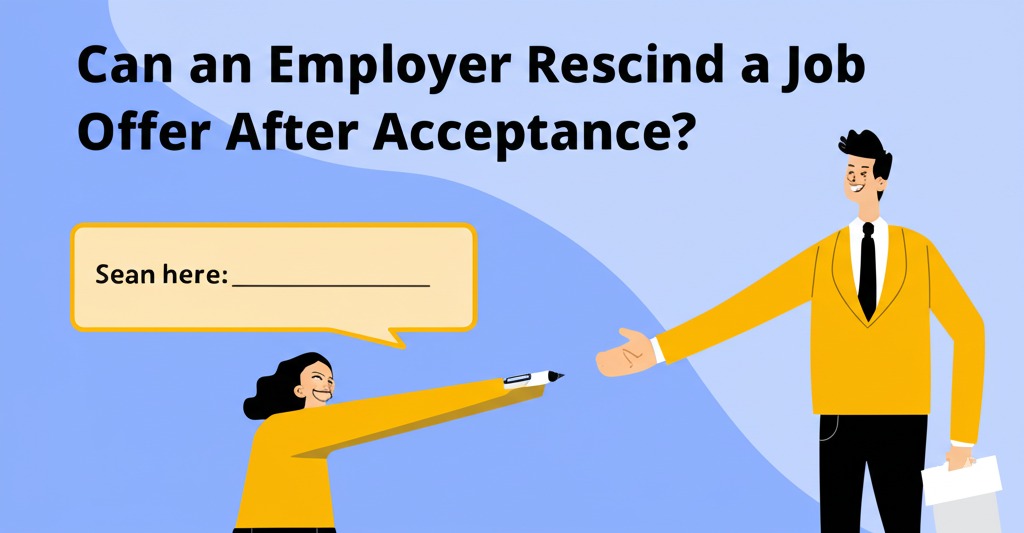
Imagine you’ve just received the job offer of your dreams. You’ve accepted it, started planning for your new role, and even told friends and family the great news. But then, out of nowhere, your employer rescinds the job offer. This can feel like a shock to your system, leaving you confused and wondering if it was even legal for the employer to do so. Can an employer really back out of a job offer after you’ve accepted it? Let’s dive into this complex issue.
What Does It Mean for an Employer to Rescind a Job Offer?
Before we delve into the specifics, it’s important to understand what it means when an employer rescinds a job offer. A rescinded job offer is when an employer takes back a job offer that was previously made to a candidate. This could happen before the new hire starts working, even after they’ve accepted the offer.
While it’s undoubtedly frustrating, the legality and the process behind rescinding an offer can vary depending on various factors, such as contract terms, employment laws, and the reason behind the employer’s decision.
Legal Grounds for Rescinding a Job Offer
The ability of an employer to rescind a job offer hinges on a variety of legal considerations. Understanding when and why an employer can take such an action will provide some clarity.
1. Employment at Will vs. Contractual Employment
In most cases, employment in the U.S. is “at will,” meaning either the employer or the employee can terminate the employment relationship at any time, for any legal reason. This applies to job offers as well. Since there’s no binding contract until you start the job, an employer generally has the right to rescind the offer as long as it’s not for discriminatory reasons or in violation of other laws.
However, if the offer is part of a written employment contract, the employer may be bound to specific terms and could be held liable for breaching the agreement. In this case, rescinding the offer could lead to legal consequences.
2. Discrimination Laws
An employer cannot rescind a job offer for discriminatory reasons. If an offer is withdrawn due to your race, gender, age, disability, or other protected characteristics, it would be considered illegal under federal and state anti-discrimination laws, such as Title VII of the Civil Rights Act of 1964. If you suspect that your job offer was rescinded because of discrimination, you may have grounds for a legal claim.
3. Fraud or Misrepresentation
If the employer rescinds the offer because they discovered that you provided false or misleading information during the hiring process—such as exaggerating your qualifications or lying about your background—this is another valid reason for the employer to withdraw the offer. Employers have a right to protect their business interests and ensure they’re hiring trustworthy candidates.
Common Reasons Employers Rescind Job Offers
Now that we’ve covered the legal grounds, let’s explore some common reasons why an employer might choose to rescind an offer.
1. Financial Difficulties
Sometimes, unforeseen financial constraints may arise, forcing a company to reconsider hiring new staff. If a company experiences a sudden downturn in revenue, budget cuts, or restructuring, they may no longer have the funds to support new hires. While this is an unfortunate situation for both parties, it’s generally not considered illegal, unless the rescinding decision violates an existing contract or other legal protections.
2. Failure to Complete Background Checks
Employers may rescind a job offer if the candidate fails to pass required background checks. This could include criminal history, discrepancies in employment history, or failed drug tests. If any of these background check results raise concerns, the employer may decide to withdraw the offer to mitigate potential risks.
3. Candidate’s Personal Circumstances Change
Life can be unpredictable. If a candidate suddenly has to relocate for personal reasons or becomes unavailable due to health issues or other unforeseen circumstances, the employer may need to rescind the job offer. While it’s not ideal for either party, it’s a practical decision in certain cases.
4. Company Needs Change
The employer may have initially needed to fill a role but could later determine that the position is no longer required due to shifts in company strategy or organizational changes. In this case, they may decide to cancel the job offer.
What to Do If Your Job Offer Is Rescinded
If you find yourself in the unfortunate position of having a job offer rescinded, it’s important to handle the situation with professionalism and clarity. Here’s what you can do:
1. Clarify the Reason
Ask the employer for a clear explanation of why the offer was rescinded. This will give you insights into whether the decision was based on valid reasons (such as background check issues or financial difficulties) or if there were other factors at play.
2. Seek Legal Advice
If you believe that the offer was rescinded due to discriminatory reasons or because the employer violated a contract, it may be beneficial to consult with an employment lawyer. They can provide guidance on whether you have grounds for legal action.
3. Keep Your Options Open
While it’s disappointing to lose a job offer, don’t get discouraged. Continue your job search, and reach out to other potential employers. It’s essential to remain proactive in your career journey.
Can You Be Compensated for a Rescinded Job Offer?
While there’s no guarantee of compensation if your job offer is rescinded, there are instances where you may be entitled to compensation. For example, if you’ve incurred expenses related to moving or relocating based on the offer (e.g., travel or moving costs), you may be able to negotiate for reimbursement.
If you had already quit your previous job in anticipation of starting the new role, you might have a case for damages, though this is rare and largely depends on the circumstances.
Conclusion: Protecting Yourself from a Rescinded Job Offer
In summary, while it’s generally legal for an employer to rescind a job offer after acceptance, the decision can be influenced by various factors, including whether the job offer was part of a contract or if it violated any laws (such as anti-discrimination laws). If your offer is rescinded, understand your legal rights, and consider seeking professional advice if necessary.
If you’re in the job search phase, it’s always a good idea to clarify any terms and conditions before accepting an offer, and to stay cautious about changes in the employer’s circumstances. Keep exploring your opportunities and don’t let one setback hold you back from achieving your career goals!

Andre Cuevas provides career insights, job search strategies, and professional advice to help individuals navigate the job market and achieve their career goals.





